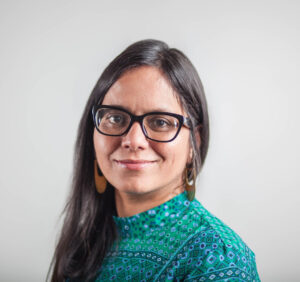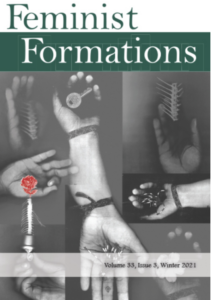Illuminating Humanities: Chaitanya Lakkimsetti

Chaitanya Lakkimsetti, 2023-24 Glasscock Internal Faculty Residential Fellow | Department of Philosophy, Texas A&M
The Glasscock Center is excited to continue this series that highlights humanities research at Texas A&M, as well as the vital role played by the humanities beyond the academy.
For this highlight, we invite Dr. Chaitanya Lakkimsetti to tell us about how the Glasscock Center has supported her work over the last several years.
Dr. Chaitanya Lakkimsetti is an Associate Professor in the Department of Sociology at Texas A&M University and an affiliated faculty member with Women’s & Gender Studies. Her scholarship examines the intersections of gender, sexuality, the state, and law. Her most recent publication, “‘Hang the Rapists Immediately’: Rape Vigilantism, State Violence, and Impunity in Contemporary India” (Signs, 2024), examines growing demand for instance justice as a response to rape in contemporary India. Central to Dr. Lakkimsetti’s work is a commitment to transnational and non-Western frameworks. She seeks to understand how sexuality and gender can act as sites for state expansion through biopolitics and juridical power.
“Contributing to the transnational, post-colonial, and transnational feminist conversations is my scholarly agenda,” she explains. “I see my scholarship helping shift the conversations and illuminating important social issues like what’s happening in India in terms of how such gender-based violence is used as a way to embolden state and social dominance.”
Throughout the years, the Glasscock Center has provided pivotal support for Dr. Lakkimsetti’s research and collaborations. As the recipient of several fellowships and grants, she has been able to develop her interdisciplinary research and foster key relationships with other scholars.
“The Center is very valuable to scholars like me, who are interdisciplinary, [because] it’s a space to have conversations and to find support,” she says. “Especially on a campus like ours where it’s huge [but] we don’t have that much space to have these conversations, it’s been very rewarding to have this journey with the Glasscock Center.”
Dr. Lakkimsetti first received support from the Glasscock Center in 2015 in the form of a Faculty Fellowship. The funding supported research on her first book, Legalizing Sex: Sexual Minorities, AIDS, and Citizenship in India (2020), which assesses the impact of the HIV/AIDS crisis in contemporary India on the relationship between gender and sexuality in minoritized populations. Her book investigates how communities can both create spaces of resistance to the state and also how those spaces can become extensions of the state.
 In 2019, Dr. Lakkimsetti and Dr. Vanita Reddy (Department of English) received a grant from the Glasscock Center for a three-year seminar called “#MeToo and the Transnational Politics of Social Media Feminism;” for Dr. Lakkimsetti, the grant was “a game changer.” The seminar developed frameworks for theorizing feminist movements in a transnational context and supported work on a comparative project on the #MeToo movements in India and the U.S. scholarly output from the seminar includes a special issue on #MeToo and Transnational Gender Justice curated by Drs. Lakkimsetti and Reddy in the academic journal Feminist Formations and an anthology (forthcoming in 2025 from NYU Press) that examines this important inflection point in global conversations about sexual violence.
In 2019, Dr. Lakkimsetti and Dr. Vanita Reddy (Department of English) received a grant from the Glasscock Center for a three-year seminar called “#MeToo and the Transnational Politics of Social Media Feminism;” for Dr. Lakkimsetti, the grant was “a game changer.” The seminar developed frameworks for theorizing feminist movements in a transnational context and supported work on a comparative project on the #MeToo movements in India and the U.S. scholarly output from the seminar includes a special issue on #MeToo and Transnational Gender Justice curated by Drs. Lakkimsetti and Reddy in the academic journal Feminist Formations and an anthology (forthcoming in 2025 from NYU Press) that examines this important inflection point in global conversations about sexual violence.
“Our position is to bring awareness to the already long histories of feminist movements in [non-U.S.] countries,” she says. “The anthology really helped to bring a non-Western and transnational perspective to the #MeToo movement; instead of seeing it as a diffusion of a U.S. movement, we see it as an interaction.”
Most recently, Dr. Lakkimsetti was the recipient of a Glasscock Internal Faculty Residential Fellowship, which provides semester-long support for faculty working on a major research project. The fellowship facilitated the continuation of her project with Dr. Reddy, as well as the time to develop her new book project, tentatively titled Demanding Death: Rape, the Death Penalty, and Vigilante Violence in Contemporary India. A product of Dr. Lakkimsetti’s longer engagement with sexuality, law, and the state, her research explores popular notions of justice and how they impact conversations and interventions around sexual violence.
“The time as an internal fellow helped me to think about violence from the state and the public – not as two separate things but looking at it as a continuous form,” she says. “And looking at the extrajudicial violence, which is very often deployed and celebrated by the public in India because of the way in which [formal] law is seen as inefficient and inadequate.”
Interdisciplinary and collaborative work helps Dr. Lakkimsetti think through dimensions of social movements that sociology alone may not be able to engage with; specifically, her collaborations with Dr. Reddy have played an important role. “One of the highlights for me of being at Texas A&M is finding collaborators like Dr. Reddy—that’s a [scholar’s] lifeline…you just need one or two collaborators to have richer research that’s not just siloed,” she says. Currently, Drs. Lakkimsetti and Reddy are researching “Remembrance Space,” a community art project for sexual assault survivors. This art project evolved out of a class-action lawsuit brought against the City of Austin (Texas) in 2018 by sexual assault survivors for the Cities’ neglect of their cases. Drs. Lakkimsetti & Reddy are especially interested in how art evolves out of campaigns for justice and the intersections of art and social justice, or what they call “aesthetic justice.”
As a researcher whose work is impacted by social movements, Dr. Lakkimsetti hopes to incorporate more public-facing components like writing for popular magazines or journals and art exhibitions. “I’m actively trying to cultivate scholarship that is not just relevant to academic audiences and, maybe in small ways, contribute to social movements,” she says. In support of this goal, Drs. Lakkimsetti and Reddy are also currently working on bring the mosaic artist who is commissioned to create “Remembrance Space” in Austin to Texas A&M to facilitate a multi-day mosaic workshop with students and the community groups working to support sexual assault survivors. They hope that the art work that comes out of this project can be used as a traveling exhibition to generate awareness on sexual violence in our community.
“As a scholar, I feel like the thing we can do best is our research and intellectual work that will help advance conversations,” she says. “Hopefully, it will help us to shape the thinking of students and people who see this work and have broader policy implications.”
